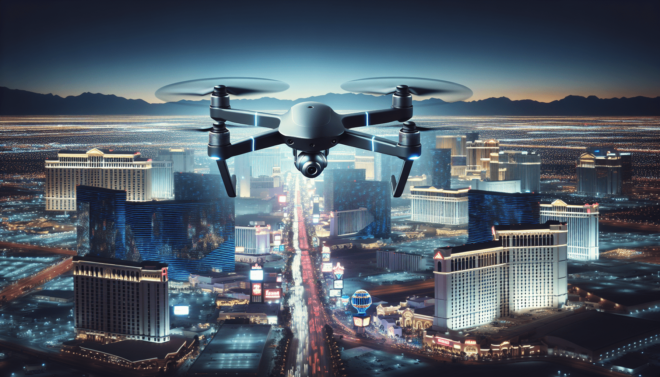Have you ever wondered how Las Vegas’ stringent security measures affect drone flights near its iconic casinos? If so, you’re in the right place. Las Vegas, a city known for its vibrant nightlife, entertainment, and opulent casinos, also takes security very seriously. This comes as no surprise, considering the high stakes and cash flows within these casinos. As a result, security measures extend beyond the casino floors, impacting various activities, including drone flights. Let’s take a closer look at how security protocols dictate drone operations in this bustling city.
The Intersection of Casinos and Drone Technology
In recent years, drones have become more than just gadgets—they are tools used for various applications, from photography to security. However, flying drones near Las Vegas casinos presents unique challenges due to strict regulations and heightened security concerns. As you might imagine, maintaining privacy, safety, and integrity in such a high-stakes environment is of utmost priority.
Why Drones Are Popular and Useful
Drones have captured the imagination of hobbyists, tech enthusiasts, and professionals. Their ability to provide stunning aerial views, fast deliveries, and efficient surveying makes them incredibly versatile. In Las Vegas, drone technology could potentially contribute to promotional videos, crowd management, and even innovative gaming experiences.
Potential Risks Associated with Drones
While drones offer many benefits, they are not without their risks. In Las Vegas, these risks are amplified by the dense concentration of people and the significant assets at stake. Some potential risks include privacy invasions, accidents, and even potential security breaches. Therefore, stringent rules are in place to mitigate these risks and ensure the safety and privacy of casino patrons and operations.
Understanding Las Vegas’ Airspace Regulations
Flying a drone isn’t as simple as launching it and steering it through the skies. Various rules and regulations govern the airspace in Las Vegas, particularly around critical areas like casinos. As a drone operator, you need to be aware of these to stay within the legal framework and ensure the safety of those around you.
Federal Regulations and Their Impact
The Federal Aviation Administration (FAA) is primarily responsible for the airspace above the United States, including Las Vegas. They have set regulations that you must adhere to, such as registering your drone, understanding no-fly zones, and maintaining visual line-of-sight with the drone. Casinos often fall within areas that are highly restricted due to these federal guidelines.
State and Local Restrictions in Nevada
Nevada itself has its own set of regulations that align with or augment federal rules. Las Vegas, being a densely populated city with many high-profile sites, often imposes stricter local ordinances. For example, certain areas may be designated as no-fly zones year-round due to events and festivities that occur regularly. Being aware of these local restrictions is crucial for responsible drone operations.
No-Fly Zones and Casino Boundaries
No-fly zones are areas where drones are prohibited. Understanding the scope of these zones in Las Vegas is key, as they often extend across large sections of the city, including the areas surrounding its numerous casinos. These zones are in place to prevent unauthorized or potentially hazardous drone activity, ensuring a secure environment.
The Role of Security Measures in Drones Near Casinos
Casinos are not just architectural marvels filled with entertainment; they are also high-security zones due to the large sums of money involved. As a result, security measures concerning drone flights near casinos are an integral part of their operations.
A Blend of Technology and Manual Vigilance
To protect the establishments, casinos employ a combination of advanced technology and tried-and-true techniques. Should you wish to operate a drone nearby, be aware that high-resolution cameras, radio-frequency jammers, and vigilant security personnel are monitoring the area relentlessly, ensuring that no unauthorized drone flies in the vicinity.
Technological Measures Against Drones
Casinos may use drone detection systems that leverage radar, radiofrequency, and thermal detection to identify drones in the area. These systems are often integrated into the overall security infrastructure, allowing immediate response to any potential drone threats. Operators of drones must respect these technologies and understand their capabilities fully.
Licensing and Permissions for Legitimate Drone Use
For professionals using drones for legitimate purposes, like photography, obtaining the necessary permissions is crucial. You must navigate a complex system of licensing with local authorities and sometimes directly with the casino itself. These permissions act as legal guarantees for both the operator and the establishment, ensuring that all parties are protected.
Table: Summary of Drone Flying Requirements
| Requirement | Description |
|---|---|
| FAA Registration | Mandatory for drones weighing over 0.55 lbs. |
| Visual Line-of-Sight | Drones must be kept in the operator’s visual line-of-sight at all times. |
| No-Fly Zones | Strictly adhered to, especially around casinos and crowded venues. |
| Local Permissions | Required for operations within the vicinity of casinos in Las Vegas. |
| Drone Detection Technology | Used by casinos to monitor and respond to unauthorized drone activities. |
Navigational Challenges for Drone Operators
Piloting a drone in Las Vegas requires great skill and vigilance due to the airspace’s complexity. Several navigational challenges arise, making careful planning and execution crucial.
GPS and Signal Interference
Las Vegas, with its bright lights and electronic signals, is infamous for GPS and radiofrequency interference. This can disrupt your drone’s navigation systems, leading to potential loss of control. Being equipped with the knowledge of how to handle such situations is vital for any drone operation to be a success.
Operating in Crowded and Urban Spaces
Las Vegas’ bustling environment, filled with skyscrapers and dense crowds, poses a significant challenge for drone operators. Navigating these urban landscapes requires advanced flying skills and constant awareness of surroundings to avoid accidents or incidents.
Legal and Ethical Considerations
Flying a drone near a Las Vegas casino requires not just technical skill but also an understanding of legal and ethical considerations. These ensure that your drone activities do not infringe on rights or privacy.
Privacy Concerns and Ethical Boundaries
One of the most significant concerns for casinos is the invasion of privacy. Your drone could inadvertently capture private moments of guests, leading to ethical and legal challenges. Staying respectful of others’ privacy and adhering to ethical standards is paramount for any drone operator.
Consequences of Unlawful Flying
The repercussions of violating these regulations can be severe, including hefty fines, confiscation of equipment, or even legal action. Understanding the gravity of potential infractions and adhering to all rules and guidelines is crucial to avoiding such scenarios.
Best Practices for Safe and Legal Drone Operation
By adhering to best practices, you can enjoy the benefits of drone technology while avoiding pitfalls. These practices ensure safety, legality, and respect for the bustling environment of Las Vegas.
Planning and Preparation
Before taking to the skies, extensive planning is necessary. Scout the area during non-peak times, evaluate any interference or obstacles, and always have a plan B should something go awry. Preparation can make all the difference in a successful drone operation.
Training and Skill Development
Being a skilled drone operator involves ongoing training and development. Regular practice flights, keeping up-to-date with new regulations, and understanding the latest technologies are essential for staying competent and compliant.
Community Engagement and Respect
Engaging with the Las Vegas community and respecting local customs and guidelines can improve your drone flying experience. Staying informed about any changes in regulations or events that may affect your decisions is crucial to successful operations.
The Future of Drones in Las Vegas
As technology advances and new applications for drones are discovered, the future of drone operations in Las Vegas will continue to evolve. Here’s a glimpse into what that could look like and how it may impact both drone operators and casinos.
Emerging Technologies and Their Implications
Drones are likely to become more integrated into Las Vegas’ entertainment and security infrastructure, driven by advancements in AI and machine learning. This may lead to more cooperative measures between operators and casinos, expanding possibilities for innovative uses while maintaining strict security protocols.
Evolving Regulations to Match Growth
As the technology grows, so will the regulatory landscape around drones. This evolving framework will hopefully balance innovation with strict safety and privacy considerations, making it crucial for operators to stay informed about future changes.
Collaborative Efforts and Industry Partnerships
In the future, partnerships between drone technology companies and the casino industry could lead to mutually beneficial outcomes. Sharing technology, developing new use cases, and collaborating on security measures could facilitate a new era of aerial technology use in Las Vegas.
In summary, navigating the complex dynamics of drone flights near Las Vegas casinos requires a comprehensive understanding of federal, state, and local regulations. By respecting these protocols, acknowledging the security measures in place, and observing best practices, drones can enhance the city’s vibrant life without compromising safety or privacy. As regulations and technologies evolve, continued adaptation and learning will be crucial for everyone involved in this space.

